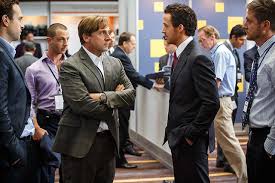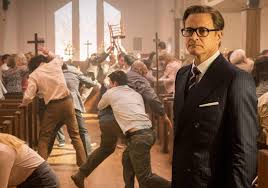A BIT SHORT: The Big Short and The Hateful Eight
Posted: December 23, 2015 | Author: Donald | Filed under: Uncategorized | Tags: Adam McKay, Brad Pitt, Bruce Dern, Channing Tatum, Charles Randolph, Christian Bale, Damian Bichir, Ennio Morricone, Jennifer Jason Leigh, Karen Gillan, Kurt Russell, Melissa Leo, Michael Lewis, Michael Madsen, Quentin Tarantino, Ryan Gosling, Samuel L. Jackson, Steve Carrell, The Big Short, The Hateful Eight, Tim Roth, Walton Goggins | 1,892 Comments »First, a word from our sponsors: I am now offering a new service: so much emphasis has been given lately to the importance of the opening of your screenplay, I now offer coverage for the first twenty pages at the cost of $20.00. For those who don’t want to have full coverage on their screenplay at this time, but want to know how well their script is working with the opening pages, this is perfect for you. I’ll help you not lose the reader on page one.
Ever wonder what a reader for a contest or agency thinks when he reads your screenplay? Check out my new e-book published on Amazon: Rantings and Ravings of a Screenplay Reader, including my series of essays, What I Learned Reading for Contests This Year, and my film reviews of 2013. Only $2.99. http://ow.ly/xN31r
and check out my Script Consultation Services: http://ow.ly/HPxKE
Warning: SPOILERS
 The Big Short, like Spotlight, is the one of those movies ripped from the headlines—of years and years ago; but this time the subject is not pedophile priests, but the downfall of the American economy. Written by Charles Randolph and the director Adam McKay, from a book by Michael Lewis, it’s also a very satisfying bit of agitprop theater with Brechtian distancing devices thrown in for good major.
The Big Short, like Spotlight, is the one of those movies ripped from the headlines—of years and years ago; but this time the subject is not pedophile priests, but the downfall of the American economy. Written by Charles Randolph and the director Adam McKay, from a book by Michael Lewis, it’s also a very satisfying bit of agitprop theater with Brechtian distancing devices thrown in for good major.
It basically tells the story of four different groups of people who all realized, more or less at the same time, and years ahead of schedule, that the housing mortgage bubble was going to burst in 2007 and destroy the world’s economy.
This leads to the movie’s major irony: the people who figured this out then proceed to invest heavily against the U.S. economy, making tons of money when their Cassandra like prediction of doom came true.
So basically, we in the audience, along with the characters in the movie, find ourselves and themselves actually hoping that the U.S. financial system tanks like the Titanic. Read the rest of this entry »
KING, QUEEN AND PAWNS: Movie reviews of Kingsman: The Secret Service, Song of the Sea and Timbuktu by Howard Casner
Posted: February 18, 2015 | Author: Donald | Filed under: Uncategorized | Tags: Abderrahmane Sissako, Abel Jefri, Brendon Gleeson, Colin Firth, Dave Gibbons, David Rawle, Fionnula Flannagan, Jane Goldman, Kessen Tall, Kingsman: The Secret Service, Mark Hamill, Mark Millar, Mark Strong, Matthew Vaughn, Michael Caine, Samuel L. Jackson, Sofia Boutella, Song of the Sea, Taron Egerton, Timbuktu, Tomm Moore, Will Collins | 1,046 Comments »First, a word from our sponsors. Ever wonder what a reader for a contest or agency thinks when he reads your screenplay? Check out my new e-book published on Amazon: Rantings and Ravings of a Screenplay Reader, including my series of essays, What I Learned Reading for Contests This Year, and my film reviews of 2013. Only $2.99. http://ow.ly/xN31r
and check out my Script Consultation Services: http://ow.ly/HPxKE
Warning: SPOILERS
 Kingsman: The Secret Service, the latest entry in a comic book franchise, this one with an espionage theme, is, in many ways, an impressive and handsomely made movie.
Kingsman: The Secret Service, the latest entry in a comic book franchise, this one with an espionage theme, is, in many ways, an impressive and handsomely made movie.
From a technical perspective, it’s incredibly well done with the best costumes, sets, and music money can buy. It doesn’t stint and there is nothing in this film that is an old piece of tat or is cheap as chips.
The acting is also first rate, raiding the cupboards as it does for the actors who are left who managed to not appear in The Lord of the Rings or The Harry Potter series.
And it has some beautifully well staged and directed second unit scenes of carefully, even wittily, choreographed episodes of extreme violence.
In many ways, those who like these sort of studio type tent pole films will probably find it hard to carp at anything they see.
So why did I find the whole thing dispiriting and extremely depressing?
THRILLS BOTH CHEAP AND EXPENSIVE: Movie Reviews Cheap Thrills and Captain America: the Winter Soldier by Howard Casner
Posted: April 9, 2014 | Author: Donald | Filed under: Uncategorized | Tags: Anthony Mackie, Anthony Russo, Captain America: The Winter Soldier, Cheap Thrills, Chris Evans, Christopher Markus, Cobie Smulders, David Chirchirillo, David Koechner, E.L. Katz, Ed Brubaker, Emily Van Kamp, Ethan Embry, Joe Russo, Pat Healy, Robert Redford, Samuel L. Jackson, Sarah Paxton, Scarlett Johansson, Sebastian Stan, Stephen McFeely, Trent Haaga | 1,682 Comments » In the 2012 drama, Compliance, Pat Healy played a sociopath pretending to be a police officer who manipulates the workers at a fast food restaurant into do some pretty disgusting things (and I don’t mean to the food, though from what I understand, fast food workers wouldn’t need much manipulation for that in the first place).
In the 2012 drama, Compliance, Pat Healy played a sociopath pretending to be a police officer who manipulates the workers at a fast food restaurant into do some pretty disgusting things (and I don’t mean to the food, though from what I understand, fast food workers wouldn’t need much manipulation for that in the first place).
In his newest movie, Cheap Thrills, he’s on the opposite side of the fence, playing a poor schnook being manipulated into doing disgusting things by a pair of sociopaths. Read the rest of this entry »
Movie Review of DJANGO UNCHAINED by Howard Casner
Posted: December 31, 2012 | Author: Donald | Filed under: Uncategorized | Tags: Christoph Waltz, Django Unchained, Franco Nero, James Remar, Jamie Foxx, Jonah Hill, Leonardo Di Caprio, Quentin Tarantino, Samuel L. Jackson, Walton Goggins | 11 Comments »I’m not sure I know what to make of writer/director Quentin Tarantino’s new spaghetti western/slavery pastiche, Django (as in jango with a hard “j”—the “D” is most pronouncedly silent) Unchained. However, I strongly suspect it may be genius.
Django… is in many ways a mirror image of Tarantino’s last film Inglourious Basterds, which was a giallo take on World War II films (there were times when I jokingly wondered whether Tarantino should consider suing himself for plagiarism). Neither is about what they are about. I mean, really, …Basterds is no more about Nazism and the Holocaust than Django… is about slavery. What they are both about is movies, and how many movies can Tarantino quote and pay homage to, and how brilliant a director Tarantino is, and how he can out post-modern any post-modern filmmaker.
At the same time, as in …Basterds, Tarantino takes his subject matter with a deathly seriousness. He doesn’t turn a blind, aesthetic eye to either Nazism or slavery. In fact, he, in many ways, proves the truth of that phrase, “more Catholic than the Catholics”. His view of slavery is probably the most gruesome, revolting and honest in any movie I may have seen. Though I do think his comments on the landmark TV miniseries Roots a bit too cavalier, in one way he has a point: his view of that institution is far more devastating and much harder to watch.
And I think it’s this approach that may be causing some people discomfort. In one way he trivializes his subject matter by making it subservient to his aesthetic approach: this is a post-modern spaghetti western before it is anything else. At the same time, he treats his subject matter with much more seriousness than people who treat it seriously. And it’s this aesthetic conflict that gives his movies their power: he makes highly entertaining movies about subjects that should not be entertaining. And what is worse, from his distracters’ viewpoints, he gets away with it. He not only gets away with it, he’s managed to make himself perhaps the most important and influential American director of his generation. It’s one thing to do something your rivals dislike; it’s another thing to do it better than your rivals. Failure is forgivable, success is not.
There are only two other filmmakers who I can think of who can also get away with what Tarantino does. The first are the Cohen Brothers who have also embraced the post modern approach creating movies which are often more a comment on the genre they are seriously parodying (in the true sense of the word) rather than using a purely straight approach in making their films. The second is Roberto Begnini who, I think I can safely say, is not post modern in any shape, form or matter. But he takes subject matter like organized crime, serial killers, the Holocaust and the American invasion of Iraq and sets them against the backdrop of a romance, usually a rom com.
So first and foremost Django… is a spaghetti western. It may be set against the U.S. south whereas a large number of the Italian ones are set against the Mexican revolution (with an anti-capitalist, pro-communist bent to them), but if it looks like a spaghetti western, sounds like a spaghetti western, and if it was in smellovision, would probably have the odor of a spaghetti western—well, draw your own conclusions. The sets and costumes are not what one would find in the fake West of a John Ford/Howard Hawks, but the fake West of a Sergio Leone/Sergio Corbucci. The music is often overloud and thunderous with a slight tinny sound to it here and there. The opening titles are tackily period. The cinematography betrays a certain cheap look to it at times (tres 1970’s). The only thing missing is the very bad dubbing no Italian film would be complete without.
Django… stars Christoph Waltz as a dentist/bounty hunter; Leonardo Di Caprio as a slow on the uptake slave owner; and Jamie Foxx in the title role, a freed slave who can understandably see the pleasure in killing white people and getting paid for it. Here again we sort of have …Basterds redux with Waltz playing the Brad Pitt role; Di Caprio playing the Waltz role; and Jamie Fox playing the Melanie Laurent role. The cast is filled out with what my friend called “the usual suspects” and I described as Tarantino phoning his casting director and telling him to call up every 1960’s and ‘70’s icon from small and large screen who no longer have a career to speak of and hire them (Don Johnson, Tom Wopat, Russ Tamblyn, Dennis Christopher, Don Stroud, Michael Parks-not quite the approach Spielberg used for Lincoln). There are also some nice turns by Samuel L. Jackson, James Remar, Jonah Hill and Walton, he with the Cheshire Cat smile, Goggins. In addition, keep a look out for the in-joke Franco Nero appearance.
Waltz and Di Caprio give turns that are often called bravura. Waltz savors every moment he has. It’s as if he told Tarantino, I don’t care how many pretentious lines and words you give me to say, I’m going to say each one of them as if I was eating an oyster. Di Caprio relishes his villain role as if to the plantation born. And Foxx does well in a role that is far less showy. The structure is a bit of catch as catch can. There’s an improv feel to it and Tarantino certainly doesn’t push the events as if a meteor was plummeting to earth. This is especially noticeable in an ending that has two climaxes a bit too close together. This same ending also suffers a bit because certain characters are conspicuously missing. But, as in …Basterds, it revels in an ahistoric revisionist revenge fantasy that is dynamite (pun intended). And more important, it’s never boring.
When the movie is over, one wonders what film genre, style, or aesthetic is left for Tarantino to appropriate for his own purposes. Where does he go from here? I believe even he wonders what is left for him and whether he has finally reached the end of his aesthetic sensibility. Personally, I’d love to see what he could do with a Bollywood musical. But only time will tell if post modernism is, in the end, a matter of diminishing returns for him.











